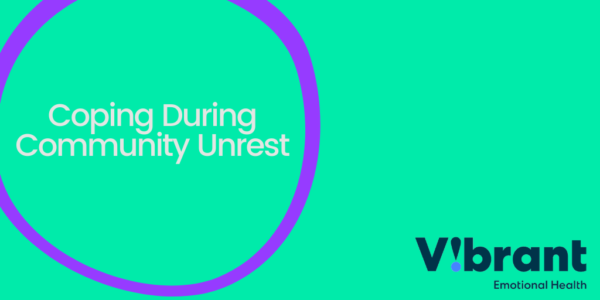Coping During Community Unrest

Click here to view a statement from Vibrant Emotional Health’s President and CEO.
This page is regularly updated with new resources and information. If you have suggestions for content to be added, please email [email protected]. Thank you.
Across the United States, many communities are experiencing unrest and distress related to the unjust treatment of individuals who are Black in this country. Some individuals may have firsthand experiences of community discord, discrimination or trauma, or may be grappling with a loss of their sense of safety.
Feeling overwhelmed or isolated, having trouble sleeping or difficulty concentrating are all common reactions to witnessing and experiencing community violence. Incidents of community violence can also contribute to heightened feelings of anxiety and depression, or lead to increased substance abuse. If you’re experiencing these emotions or feeling angry, confused, or distressed in any other way, please know you’re not alone.
You can call or text the national Disaster Distress Helpline at 1-800-985-5990 or the National Suicide Prevention Lifeline at 1-800-273-TALK (8255) to be connected with a trained, caring counselor for emotional support. Both the DDH and Lifeline are available 24/7/365 and your calls are free and confidential.
If you’re in the New York City area, call NYC Well at 1-888-NYC-WELL, text WELL to 65173, or visit their website to chat. Standard messaging/data rates apply for all texting services.
Coping Tips
- Set a limit on media consumption, including social media, local or national news.
- Notice when checking on updates is helpful and productive for you, and when it’s not.
- Talk to others who understand and respect how you feel—family members, faith leaders, people you trust.
- Educate yourself on ways to help or get involved.
- Try to do your best in taking care of yourself physically as well as mentally: this applies to your diet, sleep schedule, exercise, etc.
- Maintain regular routines to the extent possible.
- Focus on what you can do to care for yourself right here right now.
- Start with small, doable steps for you to cope or take action as you are ready. Use our resources below to think about where you might start.
Additional Coping Tips
SAMHSA has a tip sheet for coping with grief after community violence
Teen Vogue has shared a resource on how to cope with race-based trauma.
Liberate Meditation is a free app that provides meditations and talks designed by the Black, Indeginous, and People of Color Community for the Black, Indeginous, and People of Color Community.
Anxiety.com has shared an article on how Black Americans can cope with anxiety and racism.
The National Child Traumatic Stress Network has a tip sheet on reactions and actions during community violence
The BEAM (Black Emotional and Mental Health) Collective is hosting virtual support spaces. You can register here: https://www.beam.community/events
Resources for Education, Awareness and More
The National Alliance on Mental Illness (NAMI) has an information & resource page dedicated to African-Americans’ Mental Health.
The National Organization for People of Color Against Suicide is an organization that currently provides support services, information and training.
Sista Afya provides young adult Black women with mental wellness education, resource connection, and community support that empowers them to take charge of their mental wellbeing.
Healing Collective Trauma’s website addresses the diverse forms of collective trauma from a cross-cultural perspective with interviews, articles and links.
Medium has shared a detailed list of anti-racism resources.
Common Sense Media has shared tips on how to explain the news to your children, no matter their age.
The American Psychological Association’s 2016 Stress in America survey shares the impact of discrimination on one’s mental health.
The 1619 Project is an ongoing initiative from The New York Times. Created in August of 2019, the 400 year anniversary of the beginning of American slavery, the 1619 Project works to reframe our knowledge of American history by placing the consequences of slavery and contributions of Black Americans at the center of our country’s origin.
WFYI Public Media has shared an article explaining how racism, trauma and mental health are linked.
The American Association for Marriage and Family Therapy (AAMFT) has an informational page about the mental health of Black adolescents.
The Black Mental Health Alliance provides information and resources, as well as a “Find a Therapist” locator to connect individuals with a culturally competent mental health professional.
Anti-Black Racism and Mental Health is a webinar that was facilitated by the National Suicide Prevention Lifeline’s QI Coordinator, Dominique Jones, featuring Dr. Sean Joe and Robert Motley, two experts from the Brown School at Washington University in St. Louis, MO. They discussed the history of racism, police violence, racism based stress and suicide, and more.
Hilda Marie, Program Director of The Fellowship Initiative (TFI), sat down with Fellows Shemar Clarke, Reggie Woods, Roderick Hughes and Luke Delfeus to discuss TFI, the current community unrest and the effect it has on mental health.
Comments are closed here.